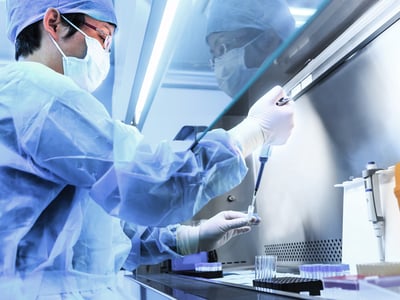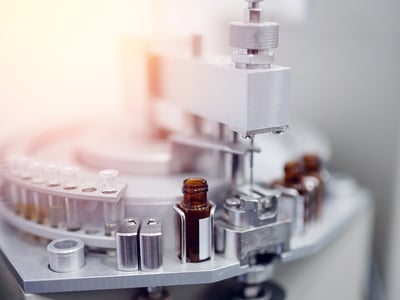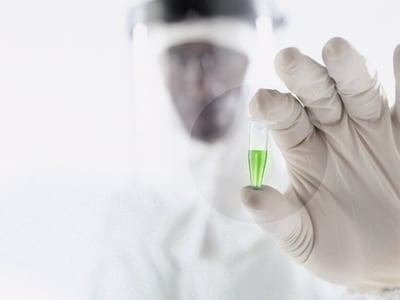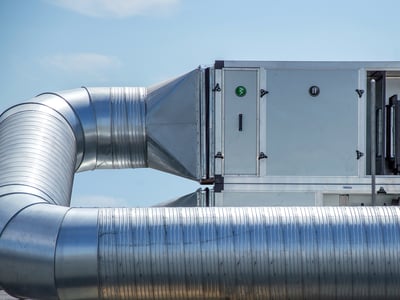Comply with the stringent health and safety requirements in pharmaceutical production while meeting mandatory quality requirements.
More and more, pharma manufacturers are looking for ways to reduce the costs associated with product manufacture yet increase safety and quality. Cleanroom air filtration and process dust collection solutions play a key role in ensuring the manufacture of high-quality pharmaceutical products while helping you increase your throughput.
Oral solid dosage (OSD) processes face two main challenges. For one, the generic drug market is putting pressure on manufacturing operations to become more agile and efficient. Filtration systems at these facilities have the potential to help lower operating costs by cutting energy consumption and equipment downtime and by providing filters with an extended lifetime.
Secondly, drugs containing high-potency compounds and active pharmaceutical ingredients (HPAPIs), like in oncology treatments, are on the rise. Their production demands enhanced operational quality and occupational safety to eliminate cross-contamination risks and to protect people and the environment. Operational flexibility also presents a challenge, requiring high quality while allowing for rapid production changeovers.
Camfil provides state-of-the-art HEPA filters and specialised dust collectors for OSD processes and facilities. OSD facilities consist of different areas that each require their own air filter or dust collector to meet various needs:
|
Area |
Solution |
|
MAU and AHU |
High-end pre-filtration for minimising total cost of ownership and protecting critical areas |
|
Milling, grinding, blending, formulating Compression suites Coating areas |
Efficient HEPA filter systems for smooth cleanroom operations – Camfil CleanSeal™ and Megalam™ Compact dust collectors – Camfil Quad Pulse Packages 1 and 2 |
|
Isolator areas Downflow booths |
Megalam and push-push filters for work environment protection |
|
Conveying and loading areas |
CamCleaner™ for maintaining a clean, safe warehouse |
|
Administrative offices |
Quality filtration to ensure employee well-being and productivity |
Camfil is a leader in air filtration solutions for the life science industry and works in close cooperation with several of the largest global pharma manufacturers. We offer filters, housings and air cleaners designed to comply with strict demands on safety, traceability and control.
Camfil’s CleanSeal™ filter housing is also specially designed for life sciences. It is a robust, fully welded, leak-proof solution that is easy to install, handle and maintain.
Control your sensitive production environment with dedicated pharma air filtration and dust collection solutions. You will gain these benefits:

Controlled environments must protect critical processes and personnel. A high level of air cleanliness is essential to protect products and to contain hazardous compounds. High-quality filtration systems help ensure regulatory compliance and maintain efficient operations.

Guarantee product safety and ensure the longest and safest shelf life by controlling production and air contact issues. Using filters that comply with cleaning agents, temperatures and standards protects both products and people.

It's imperative to protect people and the environment from highly dangerous biological, chemical or radioactive risks during research or production operation, especially within defense, the military and university labs.

Protect people, processes, products and equipment while keeping maintenance and energy costs low by keeping air handling units unclogged.

Did you know Camfil have a full range of retrofit filters that can be utilised in all the most common brands on the market. Camfil filters are not just designed to work but to optimise your dust extraction systems performance
Food and beverage Life science and healthcare Manufacturing and machinery Energy and Power SystemsIn the realm of controlled environments, where precision, purity, and protection are paramount, High-Efficiency Particulate Air (HEPA) filters emerge as unsung heroes
Food and beverage Life science and healthcare Sustainability Education and experienceEnsure cleanroom air quality with proper HEPA filter validation. Learn how ISO 14644-3 outlines essential testing procedures, including leak testing, airflow uniformity, particle counting, and filter integrity checks. Discover best practices to maintain compliance, prevent contamination, and enhance cleanroom efficiency. Read more about HEPA filter testing today!
Camfil´s Gold Series dust collector allows French life science company significant savings on energy costs and to safely handle ST1 explosive dust from carding process of alginate fibers.
Hybrid solution: Extracting process dust from five tableting machines as well as dust from a central vacuum system with 7 high vacuum extraction points with a single dust collector.
Often the initial purchase price for air filters or dust collectors is just the tip of the iceberg. The true costs for energy, maintenance and disposal are lurking below the surface. To make the most economic decision in the long-run, a detailed calculation considering all the factors will help to reduce your overall expenditure.
Processes in manufacturing facilities often generate dust and fumes which for example can pose health risks for your operators or compromise the quality and safety of your products. Determining the right capture and filtration solution helps to protect against the main risks of uncontrolled emissions and thus to create safe work environments.
Dust collection systems are an important part of any manufacturing process, so they need to be sized and designed properly. One critical design component is specifying the proper filtration media, which requires analysis of the dust in the process and all operating conditions.
To mitigate exposure and explosion risks in pharmaceutical workspaces, you have to fully understand the application and the processed ingredients. Dust testing and a hazard analysis will provide more specific information about particle size and explosive properties of your dust and thereby to determine the right extraction solution for your needs.
In many instances, pharmaceutical and chemical manufacturing involves the handling and processing of powder or granular ingredients, many of which have exposure or explosion risks attached when in dust form. A comprehensive risk assessment of each and every application is essential before evaluating the appropriate dust control solution.
Active Pharmaceutical Ingredients (API´s) create a number of challenges for pharma manufacturers and their production processes. The API’s create very fine dusts and often high solvent concentrations during the product handling and manufacturing processes. This fine dusts pose the greatest risk to the worker’s health, with harmful particles being retained in the lungs. That´s why effective filtration is required combined with containment solutions to ensure the dust doesn’t escape during normal operation as well as during routine maintenance like filter changes or waste dust disposal.
Though tablet compression does not generate large volumes of fugitive dust, safe and efficient collection of whatever dust is created by this process is critical. The dust collector linked to the press can contribute to reliable, consistent performance – or detract from it, if components are not properly designed.
Dust collectors are necessary safety systems in many manufacturing and processing plants, thus as in the food processing industry. But if they are not designed, installed and maintained properly, these systems themselves can cause serious problems. In this eBook we highlight 10 ways how to make sure your dust collection system is up to the tasks of keeping workers safe, maximising production uptime and meeting regulatory compliance.
A properly designed and installed dust collection system will effectively catch, convey and separate hazardous and nuisance dusts. Our new ePoster pinpoints key areas to watch and signs to look for that will help you avoid problems with your dust collection system and to keep up process availability in your production facility.
Almost all industrial manufacturing, processing or packaging applications generate dust as a side effect. Many of these dusts are both combustible as well as explosive, and removing them from the work place can significantly reduce the risk of serious accidents. It is estimated that there are approximately 2,000 dust explosions in Europe annually. Most of these are minor but some are very destructive. So by extracting the dust, the risk in the production is reduced, but unless the extraction system is safe the risk is just moved.
Dust collection systems are all safety devices and thus state-of-the art modern methods of validation and certification are required. Furthermore it is vital to ensure that the system is still in compliance after perhaps changed process conditions, to provide maximum safety for personnel and the facility. It is also recommended to carry out quality audits, process reliability surveys and annual safety inspections.
CleanSeal Exhaust Integrity is the next generation of exhaust HEPA housings for sensitive processes. This premium range is designed to ensure a safe operation with critical or hazardous substances. Compliant for ISO14644 testing and allows you to easily inject aerosol together with in situ filter validation scan.
G-CON Manufacturing, a mobile cleanroom provider, and Camfil recently partnered to provide their leading-edge technologies together to meet the needs of a well-known pharmaceutical customer.
Filtration is a physical, biological or chemical operation that separates solid matter – and sometimes fluids – from a mixture with a filter medium that has a complex structure through which only certain elements of the air (or fluid) can pass.
Clean air plays an imperative role in the life science, healthcare and pharmaceutical process chain. Many studies have inferred that in moderate levels of air pollution the damage to human health is irreversible. In the life science industry where biological life or living organisms are at play, it is vital to maintain utmost hygiene along with superior indoor air quality. Camfil’s high-efficiency air filtration solutions are used by many global life science industry specialists in cleanrooms, production areas, and laboratories, including many global biosafety labs around the world.
Pfizer Prioritises Energy Reduction Project. Camfil secured a supply and installation contract at the Pfizer Global Research and Development Campus in South-East Kent, UK that improved air quality and saves over £2 million.
GSX collectors are ideal for use in pharma, mining, food and chemical processing industries. They also provide a safer work environment in metalworking applications like welding and cutting.